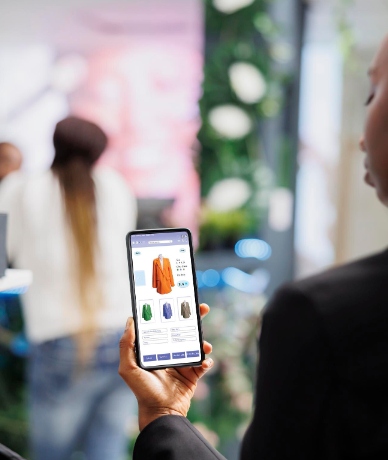Eda Cetinok
Chief Client Success Officer, Customer Experience, Ipsos.
Quantified customer experience isn’t just a metric — it is a proven growth engine. A small shift in satisfaction can unlock millions in revenue, rally teams, and reshape the future of the business.



Understanding and enhancing customer experience is key to staying competitive and achieving business growth. Retailers invest a lot in customer and employee experiences, but calculating actual return on those investments is easier said than done.
Ipsos ROCXI (Return on Customer Experience Investment) offers a strategic framework that not only identifies CX's impact on business metrics but translates that value to a language the C-Suite understands: revenue.
The Challenge
The Ipsos ROCXI Approach
Align and Select:
Assess and Analyze:
Communicate and Rally
A global automotive services retailer found itself at a critical junction. Despite running a Customer Experience Management (CXM) program for over a decade, the retailer faced significant challenges:
- Stagnant CX Learnings: The findings did not quite raise to the level of “actionable insights”, failing to translate into actionable business strategies.
- Uncertain ROI: Stakeholders lacked confidence in CX investments, with unclear connections between customer KPIs and financial performance.
- Rising Competition: In a saturated retail market, elevated customer expectations placed the retailer under pressure to improve the customer experience.
The $103M Impact: Analysis & Results
Ipsos stepped in with ROCXI, designed to seamlessly combine survey data, financial records, and operational metrics to evaluate the contribution of CX strategies and tactics to business success. The ROCXI journey encompassed three pivotal stages:
Collaborating with key stakeholders, Ipsos ensured that the organization’s CX goals aligned with broader business objectives and selected the most impactful KPIs.
Next, we defined the financial/operational metrics that are best aligned with the CX goals we identified. It’s easy to default to financial KPIs like revenue or spend; however, if financial outcomes are not the primary metric a CX program is looking to drive, other metrics like retention, advocacy, or engagement might be better measures. Most importantly, all levels of the organization must buy-in to both the CX KPI and the financial/operational metrics that will be used to show the Return on CX Investment (ROCXI). To secure buy-in, there must be trust in the underlying data and any assumptions that go into modeling impact.
By leveraging diverse data sets, Ipsos conducted a thorough analysis to quantify the influence of CX on financial outcomes.
Attempts to measure ROCXI are often stifled in search of the perfect financial/operational dataset that aligns to CX surveys. While having a 1-1 match at the customer level between survey and financial data certainly increases the precision of the ROCXI evaluation, it is not necessary to answer how CX is impacting financial/operational outcomes. Even with high-level financial/operational data, a ROCXI outcome can be produced, and business acumen plays a key role in any driving assumptions.
While ROCXI can be achieved with just an overall CX KPI, we recommend embedding drivers of your CX KPI in the survey. Further, organizations with high level of CX maturity typically establish an integrated measurement system that allows for drawing connections between business outcomes and multiple types and levels of company actions.
After the assessment, the data points were linked, and the iterative modeling process began. It is critical to the success of the ROCXI analysis that business context is included in addition to the appropriate advanced statistical approaches to produce the right, explainable model that will make sense to business users.
The insights were communicated across all organizational levels, uniting stakeholders around the significance of CX for the organization's bottom line.
The key to rallying the organization around the ROCXI impact is simulation and scenario planning, showing how changes in both the drivers of CX and the CX KPI(s) will drive improvement in financial/operational metrics. It is critical not only to set high-level CX objectives at the upper levels of the organization, but also to identify and track specific actions that should be taken at the channel/location level to improve CX.
The ROCXI analysis confirmed and quantified what every CX practitioner knows to be true: by improving customer satisfaction scores, substantial revenue gains were within reach. The analysis found:
- Potential Revenue Uplift: A 10% increase in customers rating their satisfaction from scores 1-8 to a 9 or 10 could yield a 2.5% annual sales boost, equating to a $103 million rise in revenue.
- Risk of Revenue Loss: A mere 1% decrease in customers rating a 9 or 10 could risk $13 million in revenue, showcasing the critical role of maintaining high satisfaction levels.
These insights empowered the retailer to revamp and focus their CX strategies, aiming to increase customer satisfaction and thus revenue.

A Transformative Year
Within a year of implementing new CX initiatives informed by Ipsos’ ROCXI analysis:
Retailers and CX professionals continue to be expected to do more with less. Consequently, there is an increasing need for tangible evidence of the impact of CX, not only to secure investment from the C-Suite, but also to engage frontline employees by showing what is in it for them when they improve the customer experience. Quantified impact of improved experiences is a game changer at all levels of the organization.
Quantifying the impact of CX on the bottom line can appear to be a daunting challenge and getting all levels of the organization rallied around CX and its impact an even bigger hill to climb. With ROCXI, brands are empowered with empirical evidence that CX drives financial/operational gains at all levels of the organization.
For more information on how Ipsos can help you make the most of your CX investments, contact.
- The retailer realized $10 million in revenue growth directly attributed to improved customer experiences.
- Stakeholders gained renewed confidence, viewing CX investments as integral to financial performance.
- A clear organizational focus on CX fostered a corporate culture that prioritized customer-centric strategies.
About Ipsos
Ipsos is one of the largest market research and polling companies globally, operating in 90 markets and employing nearly 20,000 people.
Our passionately curious research professionals, analysts and scientists have built unique multi-specialist capabilities that provide true understanding and powerful insights into the actions, opinions and motivations of citizens, consumers, patients, customers or employees. Our 75 business solutions are based on primary data from our surveys, social media monitoring, and qualitative or observational techniques.
“Game Changers” – our tagline – summarizes our ambition to help our 5,000 clients navigate with confidence our rapidly changing world.
Founded in France in 1975, Ipsos has been listed on the Euronext Paris since July 1, 1999. The company is part of the SBF 120, Mid-60 indices, and is eligible for the Deferred Settlement Service (SRD).




